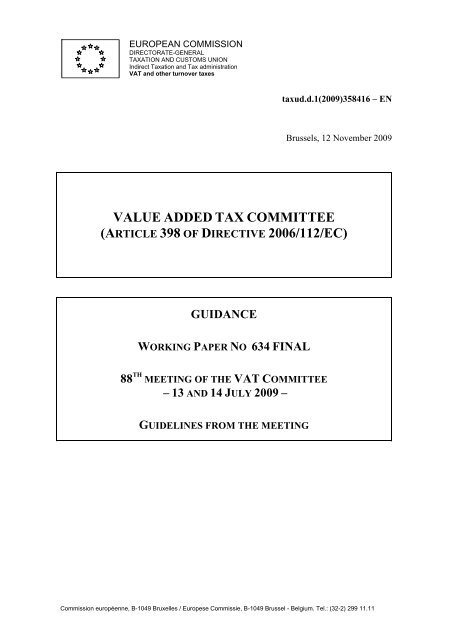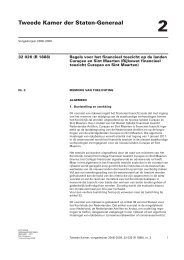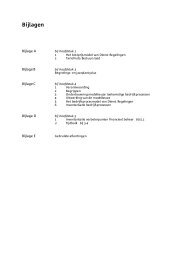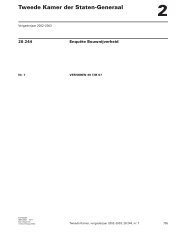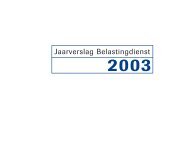VALUE ADDED TAX COMMITTEE (ARTICLE 398 OF DIRECTIVE ...
VALUE ADDED TAX COMMITTEE (ARTICLE 398 OF DIRECTIVE ...
VALUE ADDED TAX COMMITTEE (ARTICLE 398 OF DIRECTIVE ...
Create successful ePaper yourself
Turn your PDF publications into a flip-book with our unique Google optimized e-Paper software.
EUROPEAN COMMISSIONDIRECTORATE-GENERAL<strong>TAX</strong>ATION AND CUSTOMS UNIONIndirect Taxation and Tax administrationVAT and other turnover taxestaxud.d.1(2009)358416 – ENBrussels, 12 November 2009<strong>VALUE</strong> <strong>ADDED</strong> <strong>TAX</strong> <strong>COMMITTEE</strong>(<strong>ARTICLE</strong> <strong>398</strong> <strong>OF</strong> <strong>DIRECTIVE</strong> 2006/112/EC)GUIDANCEWORKING PAPER NO 634 FINAL88 TH MEETING <strong>OF</strong> THE VAT <strong>COMMITTEE</strong>– 13 AND 14 JULY 2009 –GUIDELINES FROM THE MEETINGCommission européenne, B-1049 Bruxelles / Europese Commissie, B-1049 Brussel - Belgium. Tel.: (32-2) 299 11.11
taxud.d.1(2009)358416 – Working Paper No 634 FINALVAT Committee – Guidelines from the 88 th meeting6. NEW LEGISLATION – MATTERS CONCERNING THE IMPLEMENTATION <strong>OF</strong> RECENTLYADOPTED COMMUNITY VAT PROVISIONS6.1 Origin: CommissionReferences: New Articles 44, 45, 56, 58, 59 and 192aSubject: Follow-up to the VAT package – notions associated with theplace of establishment of the supplier or the customer(Document taxud.d.1(2009)108658 – Working paper No 619)Place of businessThe VAT Committee almost unanimously confirms that to determine where the place ofbusiness of a taxable person is, it is necessary to take into account a series of factors, suchas the registered office of the business, the place of its central administration, the placewhere the management meets and the place, usually identical, where the general policy ofthat business is determined. Other factors, such as the place of residence of the mainmanagers, the place where general meetings are held, the place where administrative andaccounting documents are kept, and the place where the business' financial, andparticularly banking transactions mainly take place, may also be taken into account.The VAT Committee unanimously agrees that the place of business is the place where theessential decisions concerning the general management of the business are adopted andwhere the functions of its central administration are carried out. The fact that the placefrom which the activities undertaken by the taxable person are actually exercised is notsituated in the Member State shall not preclude the possibility of the taxable person havingestablished his place of business there.It is the unanimous view held by the VAT Committee that the presence of a letter box orbrass plate company cannot be taken to be the place of business of a taxable person if itdoes not meet the conditions above.Fixed establishmentThe VAT Committee unanimously confirms that only if an establishment is of a minimumsize and has both human and technical resources permanently present, it may be regardedas a fixed establishment.It almost unanimously agrees that to qualify as a fixed establishment, the degree ofpermanence must be sufficient and the structure adequate in terms of human and technicalresources, for the establishment supplying services covered by Article 45 of the VATDirective, in its wording as of 1 January 2010, to be capable of providing those services orfor the establishment receiving services covered by Article 44 of the VAT Directive, in itswording as of 1 January 2010, to be capable of receiving and making use of thoseservices.Permanent addressThe VAT Committee unanimously agrees that, in so far as it reflects the realities, thepermanent address of a natural person, whether or not a taxable person, is the addressentered as such in the national population register or a similar public register or, in theabsence of such a register, the address given to the tax authorities.2/5
Usual residencetaxud.d.1(2009)358416 – Working Paper No 634 FINALVAT Committee – Guidelines from the 88 th meetingThe VAT Committee unanimously agrees that the usual residence of a natural personwhether a taxable person or not, is the place where, at the time the services are supplied,that person usually lives because of personal and occupational ties or, in the absence ofoccupational ties, because of personal ties which show close links between that person andthe place where he is living.6.2 Origin: CommissionReferences: New Articles 43, 44, 45 and 214Subject: Follow-up to the VAT package – concept of taxable person –obligation to identify suppliers and recipients of services –implications for other intra-Community transactions(Document taxud.d.1(2009)130169 – Working paper No 623)The VAT Committee almost unanimously agrees that, for determining the scope ofArticle 44 of the VAT Directive, in its wording as of 1 January 2010, Title III of the VATDirective is the only reference for defining the concept of "taxable person". Inconsequence, other elements, such as the fact that the taxable person's supplies are exemptfrom VAT, or the fact that he falls under a special scheme such as the one for smallenterprises provided for by Articles 282 to 292 shall have no bearing on how the rulesgoverning the place of supply of services must be applied when the taxable personsupplies or receives services.Where, as a result of point (d) or (e) of Article 214(1) of the VAT Directive in force as of1 January 2010, a VAT identification number has been attributed to a taxable person whois entitled to benefit from non-taxation of his intra-Community acquisitions of goods otherthan new means of transport or products subject to excise duty, the VAT Committeeunanimously considers that this shall not affect that entitlement if the value of thoseacquisitions does not exceed the threshold provided for under Article 3(2).The VAT Committee almost unanimously agrees that the supply of services to a nontaxablelegal person falls, as a general rule, under Article 45 of the VAT Directive, in itswording as of 1 January 2010, unless this person is already identified for VAT purposesbecause his intra-Community acquisitions of goods are subject to VAT. If that is the case,all the services supplied to that non-taxable legal person shall be covered, as a generalrule, by Article 44 of the VAT Directive, in its wording as of 1 January 2010, and the nontaxablelegal person will be liable to pay the tax, on the basis of Article 196, in all caseswhere the supplier is a taxable person regarded as non established in the Member Statewhere the supply of services takes place.6.3 Origin: CommissionReferences: New Article 44, new Article 56(2) (as from 1 January 2013),new Article 58, new Article 59Subject: Follow-up to the VAT package – taxation at the place of thecustomer – where is the supply made to(Document taxud.d.1(2009)132177 – Working paper No 620)The VAT Committee unanimously considers that where services are taxable at the placeof establishment of the customer, requiring the supplier to determine where the customeris established, this entails that the supplier must obtain the necessary information from hiscustomer and carry out a reasonable level of verification of that information via existing3/5
taxud.d.1(2009)358416 – Working Paper No 634 FINALVAT Committee – Guidelines from the 88 th meetingsecurity procedures. The information obtained from the customer may in the case of ataxable person consist in the VAT number communicated by the customer and in the caseof a non-taxable person in factual information provided by the customer.The VAT Committee unanimously agrees that where the taxable person to whom thesupplier renders services falling under Article 44 of the VAT Directive, in its wording asof 1 January 2010, is established in more than one place, these services shall in principlebe taxable at the place where the customer has established his business. Where they areprovided to a fixed establishment of the taxable person located in another place, theservices shall however be taxable at that place.It is the large majority view of the VAT Committee that, unless there is evidence of abuseof law, only the taxable person receiving the services shall be responsible for determiningwhere the services are supplied to. In assessing whether the services are actually providedto a fixed establishment, this taxable person shall pay particular attention as to whether:– the contract and/or the order form identify the fixed establishment as the recipient ofthe services;– the fixed establishment is the entity paying for the services or the cost is actually borneby this entity;– the nature of the services if this allows for identifying the particular fixedestablishment(s) to which the service is provided.For the purposes of control, where the customer's VAT identification number mentionedon the invoice is that attributed by the Member State of the fixed establishment, thepresumption is that the services are provided to that fixed establishment unless there isproof to the contrary.A global contract is a business agreement which may cover all the services supplied to ataxable person. For services supplied under such a global contract which are to be used inseveral places, the VAT Committee at large majority confirms that these services shallalso, as a starting point, be taxable at the place where the customer has established hisbusiness. Where services covered by such a contract are actually intended for the use of afixed establishment and that fixed establishment bears the cost of those services, they shallhowever be taxable at the place where that fixed establishment is located.With regard to services supplied to a non-taxable person which are taxable at the place ofthe customer, the VAT Committee takes the almost unanimous view that in determiningthe place of supply of those services where a non-taxable person is established in morethan one place, priority shall be given to the establishment which best ensures taxation atthe place of actual consumption.4/5
taxud.d.1(2009)358416 – Working Paper No 634 FINALVAT Committee – Guidelines from the 88 th meeting6.4 Origin: CommissionReference: New Article 192aSubject: Follow-up to the VAT package – person liable for paymentof VAT – supplier having established his business in theMember State where the tax is due(Document taxud.d.1(2009)131558 – Working paper No 624)The VAT Committee almost unanimously confirms that the provisions contained inArticle 192a of the VAT Directive, in its wording in force as of 1 January 2010, do notapply to a taxable person who has established his place of business within the territory ofthe Member State where the VAT is due. That taxable person cannot, therefore, beregarded as a taxable person who is not established within that Member State for thepurpose of applying the provisions of Section I of Chapter 1 of Title XI concerningpersons liable for payment of VAT, even if that place of business does not intervene in thesupply of goods or of services.5/5


